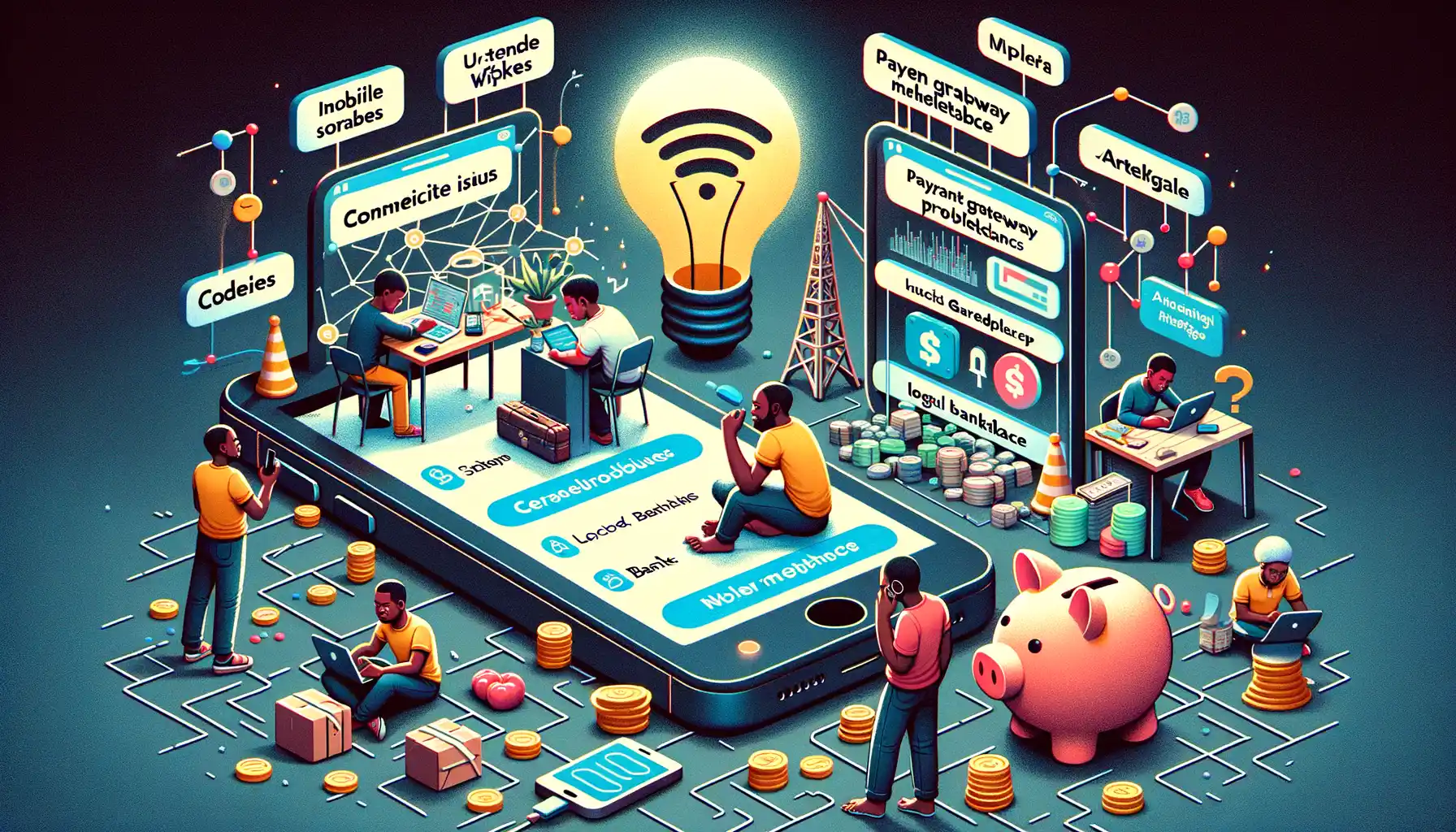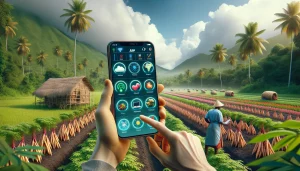Introduction to Emerging Mobile Apps in Nigeria
Step into the vibrant streets of Nigeria, and you’ll see it: smartphones in hand, bustling crowds navigating their day with a world of possibilities at their fingertips. Mobile apps aren’t just tools here—they’re revolutionizing how people connect, work, shop, and even dream. But what’s behind this digital boom? It’s not just about flashy tech; it’s the ingenuity and local flavor these apps bring to everyday life that truly sets them apart.
The Spark of Nigerian Innovation
Imagine an app that helps farmers predict weather patterns or a platform that lets small businesses sell their goods to customers across the globe. These are not hypotheticals—they’re real innovations coming straight out of Nigeria’s thriving tech hubs like Yaba (fondly nicknamed “Yabacon Valley”) and Abuja. What makes this movement so exciting is its grassroots energy. Young, ambitious developers are solving problems unique to Nigeria, from unreliable power grids to the need for more banking solutions.
Some of these emerging apps aim to tackle big societal challenges, while others focus on making daily tasks a little easier. For example:
- Payment apps filling the gap for millions without traditional bank accounts.
- E-learning platforms breaking barriers to education in rural areas.
- Health tech solutions bringing doctors and patients closer than ever before.
It’s like watching a mosaic come alive—every app, a tile adding color and character to Nigeria’s tech story. These apps don’t just work for Nigerians; they feel Nigerian. Whether it’s the intuitive design, local languages, or the way they address specific cultural needs, there’s something deeply personal about this wave of innovation.
Why This Shift Feels Personal
For many Nigerians, these apps symbolize opportunity. They’re not just downloads; they’re lifelines—for students accessing new learning tools, entrepreneurs expanding their customer base, or neighbors splitting bills seamlessly. Each launch feels like opening a door to the future, a chance to rewrite old narratives of limitation.
There’s something electric happening here. The energy of growth, the buzz of possibility—it’s all unfolding within the palms of millions. Keep reading to discover how these apps are transforming Nigeria’s entire startup ecosystem.
How Mobile Apps Are Transforming the Startup Ecosystem

Revolutionizing Business Growth Through Mobile Apps
If you’re a Nigerian entrepreneur, you’ve likely felt it—the pulse of innovation coursing through the air. Mobile apps have become the unsung heroes in reshaping how startups operate, scale, and thrive. Gone are the days when building a business meant battling red tape or relying solely on traditional brick-and-mortar setups. Now, your smartphone could be your office, marketplace, and marketing team—all rolled into one. Sounds magical, right?
Let’s take customer reach as an example. With mobile apps, even the smallest ventures can tap into vast, untapped markets. By leveraging tools like *e-wallets*, *food delivery platforms*, or *edtech solutions*, startups are transforming from local brands to national sensations—all without putting up a single billboard.
What truly stands out is how these apps democratize entrepreneurship:
- Cost efficiency: Why rent an office when you can run operations from an app? Save money for what truly matters—growth.
- Data insights: Analytics features in apps allow businesses to customize services based on user preferences. Talk about knowing your audience like never before!
The beauty here lies in simplicity. With every download and tap, mobile apps are breathing new life into startup dreams across Nigeria, propelling ideas into action faster than ever.
Key Examples of Innovative Nigerian Mobile Apps

Pioneering Nigerian Apps Changing Daily Life
Imagine waking up in Lagos or Abuja, unlocking your phone, and seeing apps that aren’t just handy but are deeply rooted in solving Nigerian realities. These are the bright sparks of innovation lighting up the startup ecosystem. Let’s explore some stars.
- Paystack: This isn’t just a payment solution; it’s a game-changer. With seamless payment integration, it’s empowering businesses of all sizes to accept payments domestically and globally. Think of it as your ticket to financial connectivity without borders.
- Farmcrowdy: Agriculture meets technology in one of the most inspiring ways possible. Farmcrowdy allows users to sponsor farming activities with just a few taps. You’re not just investing—you’re contributing to food security and supporting farmers directly.
- Gokada: Life is hectic, but Gokada is like the friendly motorbike rider who always has your back. Forget traffic gridlocks! With this app, urban commuting feels less like a chore and more like an adventure.
Shaping Sector-Specific Solutions
Industry-specific innovations? Yes, please! The Helium Health app is revolutionizing healthcare by digitizing hospitals and clinics. It’s bridging critical gaps, giving practitioners fast access to patient data while reducing the infamous “paper file hunt” we all dread.
Meanwhile, AfroLingo dives straight into Nigeria’s cultural heartbeat. Want to learn Yoruba or Igbo? This app makes language learning as fun as storytelling with interactive lessons and cultural trivia sprinkled throughout.
These apps aren’t just functional—they’re a reflection of Nigeria’s boundless resilience and creativity.
Challenges Facing Mobile App Development in Nigeria

The Struggles that Keep Developers Awake at Night
Building mobile apps in Nigeria isn’t for the faint-hearted. Sure, the country is brimming with creative energy and untapped potential, but the path to success feels like navigating a maze blindfolded. One of the loudest cries from developers? Poor internet infrastructure. Imagine trying to work on a sleek, game-changing app while your Wi-Fi blips in and out like a flickering lightbulb.
Then there’s the sticky issue of affording data plans. How do you test an app when users can barely afford to download it? This challenge puts even the most passionate developers in a tough spot—even genius thrives only when watered.
And let’s not ignore the elephant in the room: funding. Many startups are out here bootstrapping, struggling to secure investment. The result? Fantastic ideas remain buried under the weight of financial limitations. Oh, and don’t even get us started on the limited access to global payment gateways. It’s like trying to sell oranges without a basket to carry them.
- Tech skills gap: Not everyone gets access to quality coding bootcamps or mentorship, stunting innovation where it could flourish.
- Power supply woes: Ever tried working on a groundbreaking app during one of Nigeria’s famous “light-out” days? Enough said.
Future Prospects for Mobile Apps in the Nigerian Startup Scene

The Unstoppable Expansion of Mobile Innovation
Picture this: a bustling Lagos tech hub, developers buzzing with ideas, and smartphones lighting up in the hands of millions of Nigerians. This is the heartbeat of the country’s mobile app future—a future that’s brighter than ever. With over 200 million people—and more than half under 30—Nigeria is teeming with untapped potential for apps that blend creativity and practicality.
Think about what’s fueling this growth: 5G rollouts fast-tracking internet speeds, a generation of tech-savvy youths eager to innovate, and an ecosystem where mobile solutions tackle real challenges. Trust me, startups are catching on. They’re not just building apps; they’re creating life-changing tools.
- FarmConnect: Apps simplifying agriculture for rural farmers.
- Health-tech gems: Platforms enabling remote consultations and affordable medicines.
How Startups Are Redefining Success
What’s astonishing is the sheer ambition driving this space. Startups aren’t playing small—they’re aiming global. Apps like Kuda, Nigeria’s digital-first bank, are not just leading locally but showing the world what’s possible. The future? Picture AI-driven apps managing logistics chaos or even edtech apps delivering coding skills to kids in Sokoto. Nigeria’s app scene isn’t stopping; it’s leaping forward like wildfire.





